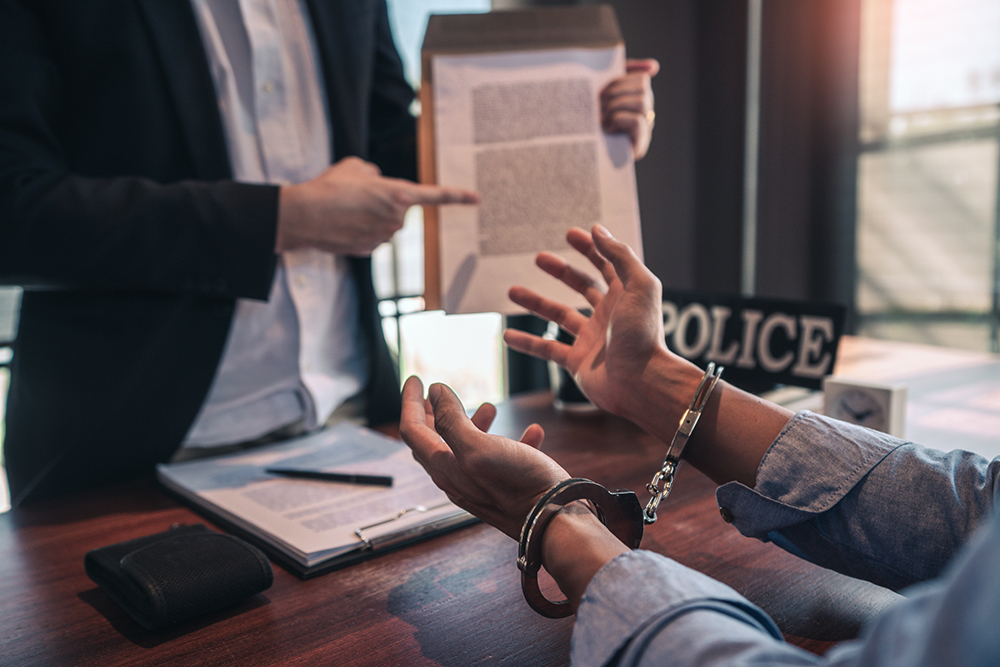Why the Right To Remain Silent Is Best

Getting arrested can be overwhelming and frightening. Your heart races, your mind floods with questions, and you may feel an urgent need to explain yourself or prove your innocence. However, one of the most important pieces of advice any criminal defense attorney will give you is simple: exercise your right to remain silent. This constitutional protection exists for good reason, and understanding why silence is often your best defense can make the difference between a manageable legal situation and a devastating one.
When you're facing criminal charges in Orlando, FL, the decisions you make in those first crucial hours after arrest can significantly impact your case. Beyond understanding your right to remain silent, knowing how bail bonds work and when to seek professional help becomes essential for protecting your future and securing your release from custody.
Understanding Your Miranda Rights
Most people are familiar with Miranda rights from television and movies, but understanding their real-world application is crucial when you're actually facing arrest.
What Miranda Rights Actually Mean
When police officers read you your Miranda rights, they're informing you of several constitutional protections:
- You have the right to remain silent
- Anything you say can and will be used against you in court
- You have the right to an attorney
- If you cannot afford an attorney, one will be appointed for you
- You can invoke these rights at any time during questioning
These rights stem from the Fifth Amendment's protection against self-incrimination and the Sixth Amendment's guarantee of legal representation.
When Miranda Rights Apply
Police must read Miranda rights before conducting custodial interrogation. This means you must be:
- In custody: Not free to leave
- Being interrogated: Questioned about criminal activity
If officers fail to read Miranda rights in these circumstances, any statements you make may be inadmissible in court. However, this doesn't mean charges will be dropped—it simply means those specific statements cannot be used as evidence.
Why Staying Silent Protects You
Your natural instinct might be to explain yourself, especially if you believe you're innocent. However, speaking without legal representation can create serious problems for your defense.
Statements Can Be Misinterpreted
Even innocent statements can be twisted or taken out of context. What you intend as clarification might be interpreted as:
- Admission of guilt
- Inconsistency in your story
- Evidence of consciousness of guilt
- Contradictory testimony
Police officers are trained interrogators who know how to guide conversations toward incriminating statements. Without legal training, you're at a significant disadvantage in these interactions.
Memory and Stress Affect Accuracy
High-stress situations like arrests can impair memory and judgment. You might:
- Misremember details about timing or events
- Provide inconsistent information unintentionally
- Agree to statements that aren't entirely accurate
- Make assumptions about what officers want to hear
These innocent mistakes can later be used to challenge your credibility or suggest deception.
Building a Defense Requires Strategy
Effective criminal defense requires careful strategy and thorough preparation. Speaking immediately after arrest prevents your attorney from:
- Reviewing all available evidence
- Understanding the prosecution's case
- Developing the strongest defense strategy
- Negotiating from a position of knowledge
Your attorney needs time to assess the situation before determining the best approach to your defense.
Common Mistakes People Make After Arrest
Understanding common pitfalls can help you avoid actions that might harm your case.
Trying to Talk Your Way Out
Many people believe they can convince officers of their innocence through conversation. This approach rarely works and often backfires because:
- Officers have already decided to make an arrest
- Your statements can provide additional evidence
- You may inadvertently admit to other crimes
- Anything you say can be used against you later
Providing Information "To Be Helpful"
Some people think cooperation will result in better treatment. However, being "helpful" can mean:
- Providing evidence against yourself
- Implicating others in criminal activity
- Giving officers information they didn't previously have
- Weakening your attorney's ability to challenge evidence
Assuming Innocence Is Obvious
If you're truly innocent, you might assume this will be apparent to everyone involved. Unfortunately:
- Innocent people are sometimes convicted
- Circumstantial evidence can be compelling
- Misunderstandings can escalate quickly
- Your innocence must be proven through proper legal channels
How Silence Helps Your Attorney
When you exercise your right to remain silent, you preserve your attorney's ability to build the strongest possible defense.
Preserving Defense Options
Your attorney can develop multiple defense strategies when they're not constrained by previous statements. These might include:
- Challenging the evidence
- Questioning police procedures
- Negotiating with prosecutors
- Preparing for trial if necessary
Avoiding Contradictions
Consistency is crucial in criminal cases. When you remain silent initially, you avoid creating contradictions between:
- Your arrest statements and later testimony
- Your version of events and physical evidence
- Your account and witness statements
- Different conversations with law enforcement
Maintaining Negotiating Power
Prosecutors often use defendants' statements during plea negotiations. When you remain silent, your attorney can:
- Negotiate from a stronger position
- Focus on weaknesses in the prosecution's case
- Avoid having to explain problematic statements
- Keep defense strategies confidential
What Happens After You're Arrested in Orlando
Understanding the arrest process in Orlando, FL, can help you navigate this difficult situation more effectively.
The Booking Process
After arrest, you'll be taken to the Orange County Jail for booking, which includes:
- Fingerprinting and photographing
- Recording personal information
- Conducting background checks
- Determining bail eligibility
- Processing into the jail system
This process typically takes several hours and can be longer during busy periods.
Initial Court Appearance
Within 24-48 hours of arrest, you'll appear before a judge who will:
- Inform you of the charges against you
- Determine if you're eligible for bail
- Set bail amount if applicable
- Ensure you understand your rights
- Schedule future court dates
This is not the time to explain your side of the story—that's your attorney's job.
Bail Determination
Several factors influence bail decisions in Orlando:
- Severity of alleged crimes
- Your criminal history
- Flight risk assessment
- Community ties
- Employment status
- Public safety concerns
Judges use these factors to set bail amounts that balance your right to freedom with community safety.
Understanding Bail Bonds in Orlando
For many people facing arrest, bail bonds provide the most practical path to release while awaiting trial.
How Bail Works in Florida
Florida law allows for several types of bail:
- Cash bail: Paying the full amount to the court
- Surety bonds: Using a bail bondsman
- Property bonds: Using real estate as collateral
- Personal recognizance: Release based on your promise to appear
Most people use surety bonds through licensed bail bondsmen because they don't have thousands of dollars readily available.
The Bail Bond Process
When you work with a bail bonds company in Orlando:
- Initial contact: You or a family member contacts the bondsman
- Information gathering: The bondsman collects case details and background information
- Fee payment: You pay the bondsman's fee (typically 10% of total bail)
- Collateral: You may need to provide additional security
- Posting bail: The bondsman posts your bail with the court
- Release: You're released with specific conditions
Why Bail Bonds Are Essential
Bail bonds serve several crucial purposes:
- Financial accessibility: Most people can't afford full cash bail
- Preserving employment: Staying in jail can result in job loss
- Family stability: Your family needs your support and presence
- Legal preparation: You can work more effectively with your attorney
- Personal responsibility: You can address underlying issues that contributed to your arrest
Choosing Professional Help in Orlando
When facing criminal charges, the quality of your legal and bail bonds representation can significantly impact your case outcome.
Selecting a Bail Bonds Company
Important factors to consider include:
- Experience: Look for companies with extensive experience in Orange County
- Availability: Choose services available 24/7 for emergencies
- Reputation: Research customer reviews and professional credentials
- Transparency: Work with companies that clearly explain all fees and procedures
- Local knowledge: Select bondsmen familiar with Orlando courts and procedures
Working with Criminal Defense Attorneys
Your attorney should:
- Have experience with cases similar to yours
- Understand local court procedures and prosecutors
- Communicate clearly about your options and likely outcomes
- Develop a comprehensive defense strategy
- Protect your rights throughout the process
The Importance of Professional Coordination
The best outcomes often result from coordinated professional help. When your bail bondsman and attorney work together effectively, they can:
- Ensure smooth release procedures
- Coordinate court appearances
- Share relevant information about your case
- Provide comprehensive support during a difficult time
Life After Bail: Following Through on Your Responsibilities
Being released on bail comes with significant responsibilities that you must take seriously.
Bail Conditions You Must Follow
Common conditions include:
- Appearing for all scheduled court dates
- Avoiding contact with alleged victims or witnesses
- Staying within specified geographic boundaries
- Reporting to pretrial services officers
- Avoiding alcohol or drugs if required
- Maintaining employment or actively seeking work
Consequences of Violating Bail Conditions
Violations can result in:
- Immediate arrest and return to jail
- Forfeiture of bail money
- Additional criminal charges
- Difficulty obtaining bail in future cases
- Negative impact on your current case
Preparing for Your Legal Defense
While on bail, you should:
- Meet regularly with your attorney
- Gather any helpful evidence or witness information
- Address any personal issues that contributed to your arrest
- Stay informed about your case progress
- Maintain stable employment and housing
Long-term Considerations
Criminal charges can have lasting effects beyond immediate legal consequences.
Potential Long-term Impact
Criminal convictions can affect:
- Employment opportunities
- Professional licensing
- Housing applications
- Educational opportunities
- Immigration status
- Family relationships
The Value of Strong Legal Representation
Investing in quality legal representation can:
- Reduce charges or penalties
- Negotiate favorable plea agreements
- Protect your long-term interests
- Minimize collateral consequences
- Preserve your reputation and future opportunities
Moving Forward With Confidence
Facing criminal charges is undoubtedly stressful, but understanding your rights and options can help you navigate this challenging situation more effectively. If you need help with bail bonds in Orlando, FL, contact Mike Snapp Bail Bonds today for more information.


